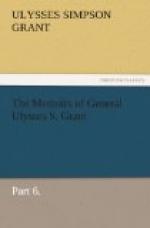Soon after the enemy had entirely evacuated Petersburg, a man came in who represented himself to be an engineer of the Army of Northern Virginia. He said that Lee had for some time been at work preparing a strong enclosed intrenchment, into which he would throw himself when forced out of Petersburg, and fight his final battle there; that he was actually at that time drawing his troops from Richmond, and falling back into this prepared work. This statement was made to General Meade and myself when we were together. I had already given orders for the movement up the south side of the Appomattox for the purpose of heading off Lee; but Meade was so much impressed by this man’s story that he thought we ought to cross the Appomattox there at once and move against Lee in his new position. I knew that Lee was no fool, as he would have been to have put himself and his army between two formidable streams like the James and Appomattox rivers, and between two such armies as those of the Potomac and the James. Then these streams coming together as they did to the east of him, it would be only necessary to close up in the west to have him thoroughly cut off from all supplies or possibility of reinforcement. It would only have been a question of days, and not many of them, if he had taken the position assigned to him by the so-called engineer, when he would have been obliged to surrender his army. Such is one of the ruses resorted to in war to deceive your antagonist. My judgment was that Lee would necessarily have to evacuate Richmond, and that the only course for him to pursue would be to follow the Danville Road. Accordingly my object was to secure a point on that road south of Lee, and I told Meade this. He suggested that if Lee was going that way we would follow him. My reply was that we did not want to follow him; we wanted to get ahead of him and cut him off, and if he would only stay in the position he (Meade) believed him to be in at that time, I wanted nothing better; that when we got in possession of the Danville Railroad, at its crossing of the Appomattox River, if we still found him between the two rivers, all we had to do was to move eastward and close him up. That we would then have all the advantage we could possibly have by moving directly against him from Petersburg, even if he remained in the position assigned him by the engineer officer.
I had held most of the command aloof from the intrenchments, so as to start them out on the Danville Road early in the morning, supposing that Lee would be gone during the night. During the night I strengthened Sheridan by sending him Humphreys’s corps.
Lee, as we now know, had advised the authorities at Richmond, during the day, of the condition of affairs, and told them it would be impossible for him to hold out longer than night, if he could hold out that long. Davis was at church when he received Lee’s dispatch. The congregation was dismissed with the notice that there would be no evening service. The rebel government left Richmond about two o’clock in the afternoon of the 2d.




